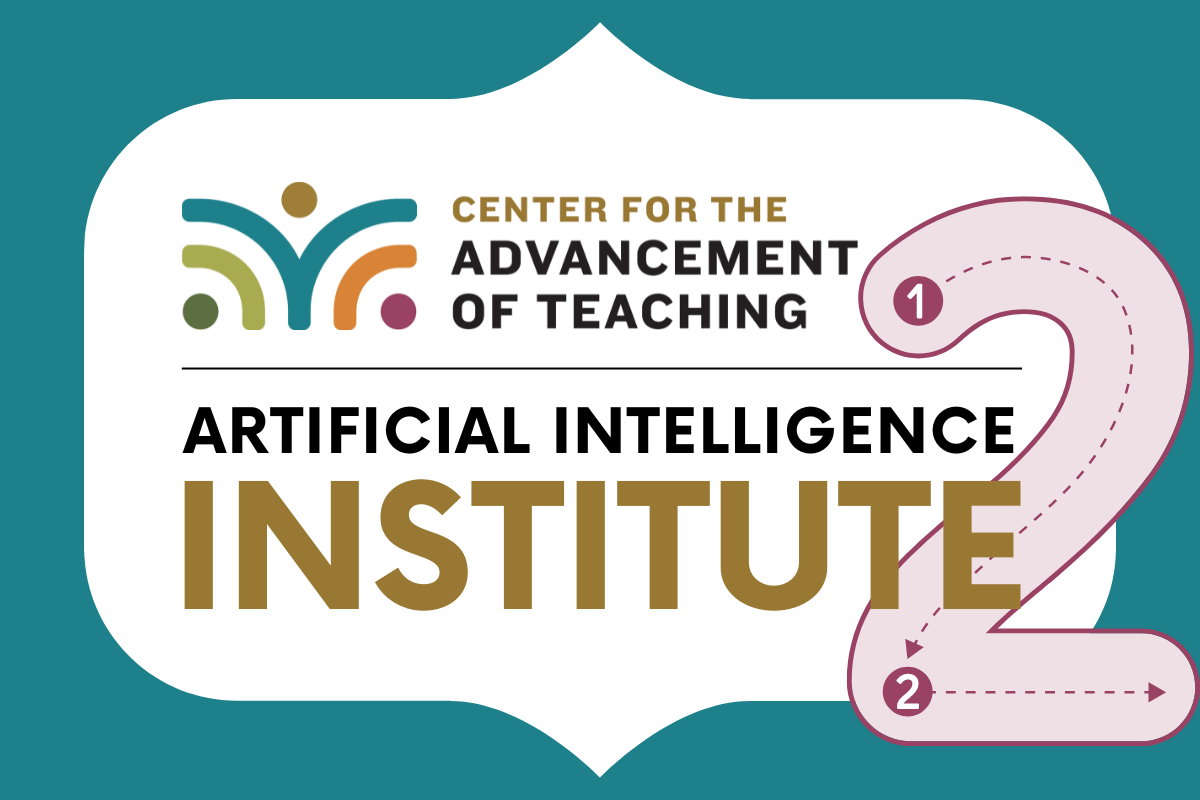AI Institute 2.0 (Past Event)

Back by popular demand, the CAT will run a second 2-day AI institute in the week between final exams and graduation. As in January, the event will run from 12:00 – 5:00 PM daily, with three 90-minute workshops punctuated by 15-minute breaks. We will also be hosting receptions to open and close each day.
We will re-run all six workshops from the January Institute alongside six new workshops as concurrent sessions. Although the new workshops are designed to be deeper dives for previous participants, all are welcome to attend any sessions of interest.
*Programs from the January Institute are indicated with an asterisk.
Tuesday, May 14th
Student & Faculty Views of AI | Karen Singer-Freeman | 11:30-11:50
This brief session will share results from a large survey of Wake Forest faculty and students. We will share current usage patterns, student views of their educational needs, and ways in which concerns, interests and responses vary across different areas of the university. By attending this session you will gain insights into the challenges, opportunities, and varied opinions surrounding AI’s role in education at Wake Forest University. Room A27/A28
Introduction to AI* | Betsy Barre | 12:00-1:30
This workshop will introduce participants to the most popular AI tools, their current capabilities, and how they were developed. We will demonstrate the impact of various prompting strategies, explore potential uses in teaching and learning, and share what we know about current use on campus. Room 349/351
AI Curriculum Support | Anita McCauley | 12:00-1:30
Curriculum and learning assessment design bring together disciplinary knowledge, pedagogical expertise, and creativity. The work can be motivating and inspiring. It can also be time and labor intensive. In this workshop, we will explore how AI can support faculty and programs by accelerating the phases of this design work. Room A27/A28
Educating for Humanity * | Betsy Barre | 1:45-3:15
In this workshop, we will explore the relationship between the rapid development of AI, our individual course goals, and the mission of the institution. What will our students need to learn to advance the good of humanity in a world transformed by AI? Which goals retain their relevance? Which do not? Room 349/351
Boosting Productivity & Efficiency with AI | Kristi Verbeke | 1:45-3:15
During this workshop, we’ll discuss the benefits of AI in academia, focusing on automating tasks, enhancing research, and improving communication. You will learn about AI tools for data analysis, time management, and personalized learning, with hands-on activities to integrate AI into your daily workflows. Room A27/A28
Maintaining Engagement* | Betsy Barre | 3:30-5:00
We know that transformative learning is most likely to occur when students are actively engaged. In this workshop, participants will learn strategies to minimize the risk of AI-facilitated disengagement while exploring the potential of AI to deepen and extend current levels of engagement. Room 349/351
Using AI to Advance Equity | Karen Singer-Freeman | 3:30-5:00
In this session, we will discuss the potential for AI to both support and impede efforts toward equity. We’ll explore scenarios and consider how different applications of AI might impact diverse student populations and inclusive learning environments. This session provides a platform to delve into the complex interplay between AI and equity in higher education settings, fostering a deeper understanding of the opportunities and challenges ahead. Room A27/A28
Wednesday, May 15th
Making Learning Visible* | Betsy Barre | 12:00-1:30
To teach well, we must monitor our students’ progress and adjust when necessary. We design assignments that make learning visible and are rightly worried that AI-generated work will distort this observation. In this workshop, participants will explore alternative assignments designed to minimize this risk. Room 349/351
Doing Research on AI & Learning | Karen Singer-Freeman | 12:00-1:30
In this workshop we equip faculty with the tools and strategies necessary to gather data directly from their students, enabling them to assess how AI is influencing their learning experiences. We will provide practical guidance on making changes to teaching in ways that will allow faculty to learn about how the changes they have implemented impact student learning. Room A27/A28
Motivating Integrity* | Betsy Barre | 1:45-3:15
If some uses of AI undermine learning and assessment, we must work to prevent such use. In this workshop, we discuss the challenges AI creates for traditional strategies (detection and punishment) and propose a number of alternatives that leverage what we know about student motivation to cheat. Room 349/351
Leveraging the Power of AI | Anita McCauley | 1:45-3:15
What do you want students to know and be able to do as a result of your course? How will they practice and demonstrate those things? How does generative AI impact those goals and support or hinder the activities and assessments you use to reach those goals? In this workshop, we will explore these questions in the context of a Spring 2024 course. Participants will see how the access and abilities of generative AI were integrated into all levels of course design and have an opportunity to apply these questions and examples to their courses. Room A27/A28
The Future of Teaching* | Betsy Barre | 3:00-5:00
In this closing session of our institute, we’ll focus on our own work as teachers. We’ll explore how AI can improve our practice, while acknowledging the risk of outsourcing teaching tasks to machines. We’ll propose strategies that enhance our pedagogy while retaining the human core of our work. Room 349/351
Empowering Student Success | Kristi Verbeke | 3:00-5:00
During this workshop, we will explore strategies for teaching students how to use AI for their learning. We’ll discuss topics such as AI applications in education, ethical considerations, and curriculum integration strategies. Room A27-A28
Date: May 14-15, 2024 (Past Event)
Time: 11:30 AM – 5:30 PM
Location: Farrell Hall
